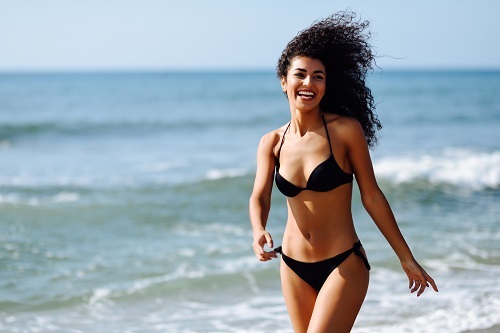
Now that summer is in full swing, we wanted to go over one of the most important accessories in your beach bag — sunscreen. Our skin is the largest organ in the human body, so we need to protect it from the elements, and this includes sun exposure. We have all seen the letters SPF on our sunscreen bottles but what does it mean — and do you need to be concerned about what number you buy? Sunscreen is an essential anti-ageing UV protection, but people tend to only apply it on the sunniest of summer days and trips to the beach. This article will explore SPF and will show why you should incorporate a decent sunscreen into your everyday skincare routine.
SPF stands for “Sun Protection Factor”. It’s a number that measures how long you can safely be in the sun before you begin to burn from UVB rays. Many factors determine your sun exposure in any given situation, including your skin type, and how intense the sun is, cloud cover, altitude and more. So remember only to take the SPF number as a guideline. Most people think that the higher SPF you apply, the least likely you are to burn. However, this isn’t strictly true.
The easiest way to understand how SPF works is if you burn in 10 minutes without sunscreen but apply sunscreen with an SPF 30, you won’t burn for approximately 300 minutes or five hours. In other words, the amount of time before you begin to burn increases by a factor of 30. We believe it doesn’t hurt to reapply sunscreen sooner because the risk of sunburn and skin damage likely depends on the circumstances. We would never go for five hours without reapplying!
When purchasing sunscreen, you also need to consider its UVA and UVB protection ratings. These ratings refer to the two harmful sun rays that do damage to your skin. UVB rays are the dangerous rays that cause sunburn and can lead to skin cancer through overexposure. Any sunscreen with SPF 30+ will adequately protect you from damage from these rays. UVA rays help you tan but also contribute to sunburn, premature ageing and wrinkles.
Unless the sunscreen brand shows a UVA rating, it will not protect you from UVA rays. In the EU, it is a requirement to have a UVA rating out of five stars displayed in a circle on the bottle. Look for a “broad-spectrum sunscreen” with four or five stars for the best protection from prolonged exposure to the sun. This will give you the best all-around protection.
Everyone should be using sunscreen. Here at Harley Street MD, we advocate for everyone wearing a daily moisturiser of SPF 30 minimum and SPF 50 when outside for long periods of sun exposure. Not only will it protect you from sunburn, but it will also slow down UV damage to your skin to delay the ageing process.
Find a formula that works for you. Sunscreens are available in lotion, spray, and gel form. If you like the protection one brand offers but not the way it feels on your skin, look to see if they do the same product in a different form.
You may need to adapt your sunscreen for your activity or location. SPF 20 to 30 may protect you on an average day in the UK, but if you work outside, it is recommended you wear something with more defence. If you are travelling to a warmer climate or heading to somewhere with a high altitude, you also need to invest in a sunscreen with a higher SPF. Should you have a procedure like Dermapen, chemical peel or microdermabrasion then you should definitely step up your SPF to at least 50.
Remember that you can still be exposed to UV rays even if it is a cloudy day. It’s great if you can find a daily moisturiser with SPF 18 to 30 for everyday use that you never leave the house without wearing. On sunny days with longer exposure, you’ll need something stronger, and it’s not a bad idea to cover up, wear a hat and try to stay in the shade when the sun is at it’s highest point in the sky.
You may be surprised to learn about the number of products in your everyday skincare routine that have an SPF in them. Moisturisers and foundations often have an SPF within a range of 5 to 15, which would be considered mild or low protection. Even specific brands of body lotion have a small amount of SPF in them so you may be protected without realising. However, if you want a little more protection, apply sunscreen after your moisturiser but before your makeup.
Using a high SPF sunscreen can leave the skin feeling greasy and can block the pores on your face, causing acne or blackheads. There are many great products available on the market that combine a high SPF with quality skincare. Brands like ZO Skin Health, Heliocare, and Obagi have ranges with SPF 30, 50 and 90 factored in. Heliocare® sunscreen is an advanced UV sun protection product that offers a high level of UVA and UVB protection — more than regular sunscreen can provide and at an affordable price. Heliocare has the added benefit of protecting you from the sun, while also combating ageing skin issues.
Many companies also offer cosmetic options, combining protection from the sun’s rays with products like primers and BB creams. No matter how much makeup you wear, there will be a product for you that not only makes your skin look great, but also gives you the protection you need to combat sun damage. This also helps to avoid the greasiness that some sunscreens can create on the face, which can feel uncomfortable and put you off applying it.
Applying sunscreen once a day is not enough — you need to reapply every few hours, immediately after swimming or sweating with activity even if you have used a water-resistant sunscreen. People also tend to under-apply their sunscreen. The NHS recommends applying approximately two teaspoons of sunscreen for your head, arms and neck, and two tablespoons if you need to cover your whole body while wearing a swimsuit.







